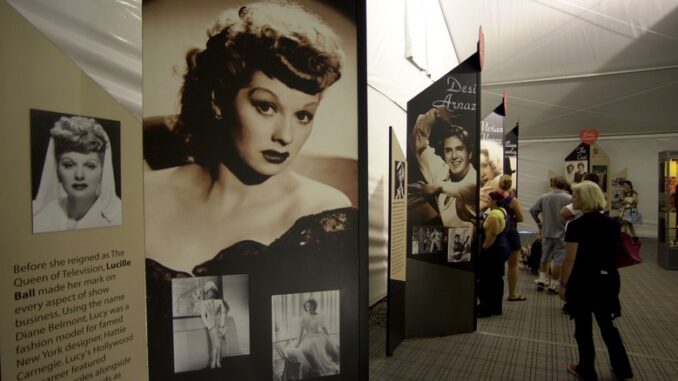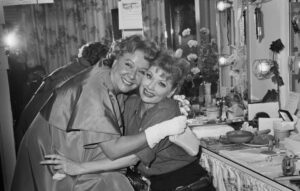
When it comes to television history, few shows have left a mark as indelible as I Love Lucy. Airing from 1951 to 1957, this groundbreaking sitcom, starring Lucille Ball and Desi Arnaz, was not just a show; it was a cultural phenomenon. As we delve into the details surrounding its ending, it’s essential to appreciate the show’s legacy and the impact it had on future generations of television programming.
The Story Behind the Show’s Success

1. Breaking Barriers in Television
When I Love Lucy premiered, it was revolutionary. The show brought a unique blend of comedy, romance, and a touch of realism that captivated audiences. It was one of the first television shows to feature a pregnant woman, and it broke new ground by depicting the challenges of married life. This innovative approach drew viewers in, allowing them to connect with the characters on a personal level.
2. The Dynamic Duo: Lucy and Ricky
Lucille Ball’s portrayal of Lucy Ricardo, coupled with Desi Arnaz’s charming Ricky Ricardo, created a dynamic that was both relatable and hilarious. Their chemistry was palpable, making viewers feel as if they were part of their journey. The couple’s antics, from Lucy’s wild schemes to Ricky’s ever-patient demeanor, formed the backbone of the show’s comedic genius.
The Build-Up to the Finale
3. The Impact of the Show’s Format
One of the unique aspects of I Love Lucy was its use of a three-camera setup, which was groundbreaking for its time. This format allowed for a live audience, creating an atmosphere of spontaneity and energy that drew viewers in. The laughter of the audience became part of the show, enhancing the viewing experience.
4. A Shift in Narrative Focus
As the series progressed, the narrative began to shift. The focus moved towards more dramatic storylines, with Lucy facing challenges that resonated with viewers on a deeper level. The combination of comedy and real-life issues made the show more than just entertainment; it became a reflection of the times.
The Final Episode: A Heartfelt Goodbye
5. The Last Episode: What Happened?
The series finale, which aired on May 6, 1957, was titled “Lucy Meets the Mertzes.” It was a bittersweet end to an era, bringing closure to Lucy and Ricky’s journey. The episode focused on the Ricardos preparing to move to Hollywood, and it was filled with nostalgia as it revisited many of the show’s beloved characters.
6. A Nostalgic Look Back
As Lucy and Ricky packed up their lives, the episode was filled with flashbacks, revisiting memorable moments from the show. This trip down memory lane resonated with fans, allowing them to relive the magic of I Love Lucy one last time.
Behind the Scenes: The Making of the Finale
7. The Emotional Toll on the Cast
Filming the finale was an emotional experience for the cast and crew. Lucille Ball, in particular, felt a deep connection to the character she had embodied for six years. This emotional investment added a layer of authenticity to the finale, making it a heartfelt farewell.
8. The Influence of Lucy and Desi’s Real-Life Relationship
The chemistry between Lucille Ball and Desi Arnaz extended beyond the screen. Their tumultuous real-life marriage added depth to their characters. As they prepared to say goodbye, it was evident that their personal experiences influenced the emotional weight of the finale.
The Cultural Impact of the Finale
9. Leaving a Lasting Legacy
The series finale of I Love Lucy wasn’t just an end; it was a significant cultural moment. It set the stage for future sitcoms and paved the way for how television shows concluded. The emotional depth and comedic brilliance of the finale inspired countless writers and producers.
10. How the Show Influenced Future Sitcoms
The blend of comedy and real-life issues in I Love Lucy has been emulated by many shows since. Its format, character development, and storytelling techniques have influenced a plethora of sitcoms, making it a cornerstone of television history.

Reflecting on the Finale’s Themes
11. Love and Friendship
At its core, I Love Lucy was about love and friendship. The finale encapsulated these themes, showcasing the strong bond between Lucy and Ricky, and their friends, the Mertzes. It reminded viewers of the importance of relationships, even as life changes.
12. Change and New Beginnings
The finale also emphasized the inevitability of change. As the Ricardos prepared to leave New York for Hollywood, it served as a metaphor for moving on and embracing new adventures. This theme resonated with audiences, encouraging them to reflect on their own life transitions.
The End of an Era
13. The Lasting Impact on Television
Even today, I Love Lucy remains relevant. The humor, heart, and groundbreaking nature of the show continue to resonate with new generations of viewers. The show has been re-aired countless times, and its influence can be seen in many modern sitcoms.
14. Why Fans Still Love Lucy
Fans cherish I Love Lucy not only for its humor but for its ability to connect with audiences on a personal level. The characters felt like friends, and the situations they faced mirrored the challenges of everyday life. This connection keeps the spirit of Lucy alive, even years after the show ended.
Conclusion: A Timeless Classic
The conclusion of I Love Lucy may have marked the end of a beloved series, but it left an indelible mark on television history. The combination of laughter, love, and life lessons made it a timeless classic. As we remember the iconic finale, we celebrate not just the end of a show, but the beginning of a legacy that continues to inspire and entertain.